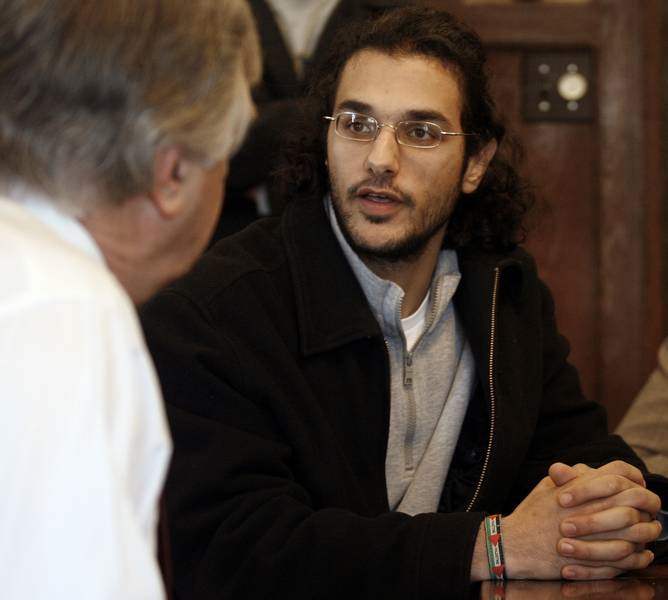
Stay involved, UT president advises Arab, Muslim students
2/23/2006
President Daniel Johnson listens to student Emad Abouarab. 'Being Arab right now seems to be like a crime,' Mr. Abouarab said. 'I feel we are defending ourselves because we are Arab.'

President Daniel Johnson listens to student Emad Abouarab. 'Being Arab right now seems to be like a crime,' Mr. Abouarab said. 'I feel we are defending ourselves because we are Arab.'
University of Toledo President Dan Johnson opened his office yesterday to seven members of the campus' Muslim and Arab student groups to discuss the news of three local men - two with ties to the university - accused in a terror plot.
"We want to thank him for his continuing effort for peaceful interaction and nondiscrimination on campus," said Rabia Khan, vice president of the Muslim Student Association.
Her group and the Arab Student Union also thanked the president for his campuswide e-mail Tuesday - the day Mohammad Zaki Amawi, Marwan Othman El-Hindi, and Wassim I. Mazloum were indicted in the plot.
Mr. Amawi attended UT for about four months in 2001 and had an undecided major. Mr. Mazloum has been a UT student since January, 2001, and is majoring in computer science and engineering.
The student groups' meeting was one of many sessions held yesterday or scheduled to be held in the community in the wake of the federal grand jury indictments on terrorism charges.
Residents in the 5500 block of Grey Drive in Sylvania - the address for Mr. Mazloum that was one of at least two places searched by authorities Sunday - lined the street with about 100 American flags.
A resident said there was a neighborhood meeting Tuesday night and the flags went up last night to show support of the United States, American troops, and the freedoms in America.
Tonight, a meeting is scheduled between local Muslim leaders and federal law enforcement officials to discuss community safety and other issues.
Members of UT's Muslim and Arab student groups said that while some in their communities may be angry and frustrated, reaction by fellow university students was positive and there was no backlash yesterday.
"We were very surprised [by the news]. It's stunning when it's so close to home," said Imad Hariri, treasurer of the Arab Student Union.
Neither of the suspects with UT ties was a member of the Muslim or Arab student organizations, group members said. They said they have never seen the men nor had any contact with them.
Mr. Johnson told the students, who were seated around his conference table, that he was concerned about them and how the recent events might affect them.
The UT president told them it was important to keep communication alive during times like this when "real values and diversity are tested." This is also a time, he said, when the groups can exhibit their pride and educate others about their cultures and beliefs.
"I hope that when the dust settles in this, that we will feel more united," Mr. Johnson said. "This is something that can divide us."
One of the students, Emad Abouarab, who accused President George Bush of being a "terrorist president," raised many questions and expressed many concerns.
"Being Arab right now seems to be like a crime," he said. "I feel we are defending ourselves because we are Arab."
Mr. Johnson said he felt badly about the student's sense of frustration and added: "It's not a crime to be Arab, believe me. We value your presence here."
Asked what the students could do, Mr. Johnson encouraged them "not to pull back and withdraw."
"Stay out there. Remain participatory. Stay engaged. Make progress," he said. "When we pull back, we isolate from each other and lose ground."
Blade staff writer David Yonke contributed to this report.